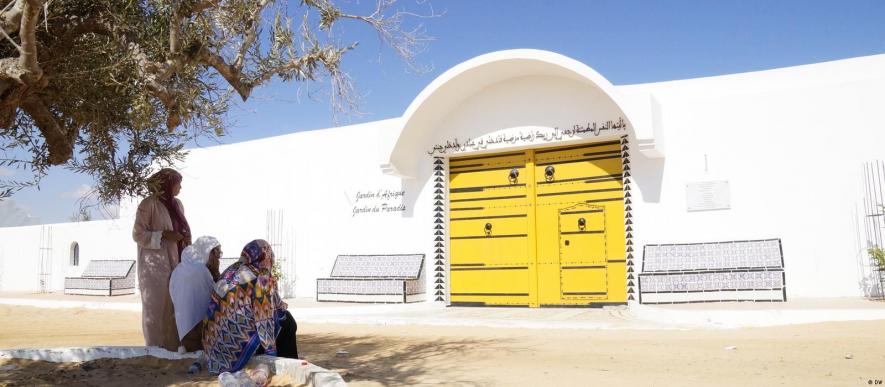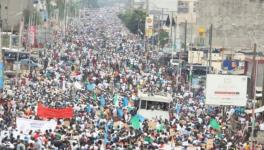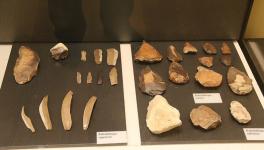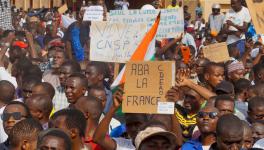Outrage, Mourning in Tunisia After Tragic Migration Attempt

Sayida al-Kunissi sits at the entrance to the Tunisian cemetery known as the "Garden of Africa" and weeps softly. She believes that somewhere here, in this graveyard on the edge of the coastal city of Zarzis in southeastern Tunisia, are the remains of her grandson, Omar Karimi.
Karimi was 15, had just finished school and was about to start training as a mechanic. But right before he was supposed to begin the course, he decided upon a different plan altogether. With 17 other people from Zarzis, he boarded a boat that was supposed to take them all to Italy. They never made it.
Karimi's family is not alone in this tragedy. Many other local families are also feeling the pain of similar loss. It is made worse by their belief that the local authorities have not yet told them the whole truth about what happened to their loved ones.
Contact lost after 48 hours
It all started over a month ago. The boat carrying Karimi and the others left Zarzis early on September 21. But after 48 hours, relatives of the passengers say they lost contact with those on board. For three weeks, nobody knew what had happened to them — until the bodies of two young men washed up on the coast.
Local officials did not initially send any search and rescue boats out to sea. Later on, city residents discovered that other bodies from the boat had also washed ashore and that they had been buried without anything being done to ascertain their identities. As a result, they were all buried without their families being informed.
![]()

Eight of the 18 people who drowned came from one neighborhood in ZarzisImage: DW
Local authorities justified their actions by saying they thought that the drowned people were foreigners from other countries. Zarzis is well known as a place where many would-be migrants embark on their journey to try and get to Europe. This includes many non-Tunisians, particularly people from Africa.
The news of how the incident was handled has caused anger and outrage in Zarzis and throughout the rest of the country. Many thought the way the corpses were treated was dishonorable. In mid-October, the funeral of one of the young victims who had been identified was followed by several days of demonstrations and then a one-day general strike in Zarzis.
No graveyard access
This week, Karimi's grandmother, Sayida al-Kunissi, would very much like to go into the graveyard. She doesn't know for sure if her grandson is in there but she fervently believes he is.
The "Garden of Africa" was created by Algerian artist Rachid Koraichi so that unidentified individuals who had drowned nearby in the sea, many of them from sub-Saharan Africa, could be given a proper burial. There's another older cemetery nearby for the same purpose, called the "cemetery of strangers," but it's in the middle of a wasteland — that's one of the reasons Koraichi wanted to create the "Garden of Africa."
![]()

The 'Garden of Africa' cemetery was so unidentified drowning victims could be buried with dignityImage: DW
Police currently stand guard in front of the graveyard. The local prosecutor's office, reacting to national outrage, is finally investigating. The remains of those recently buried here will undergo DNA testing to confirm identities; the police are there so the procedure can happen without disturbances.
DW inquired with local city officials but received no comment. At the time of writing, seven of the missing locals had been identified; a further 11 are still missing, presumed drowned.
Which is why al-Kunissi can only wait outside and hope that soon she will know what happened to Karimi. "We are just here to catch his scent," she told DW.
Her daughter, Hajar, Karimi's mother, is more determined. "I won't back down in the fight for my son's rights. Why did they bury him like a stranger? I want to visit him, to read the Koran to him. Peace to his soul," she declared angrily.
Authorities did not act
Another local man, Bassam al-Warimi, is also in mourning. He lost two relatives in the accident at sea. At first, local authorities told him that the passengers of the boat had been stopped in Libya. But then, al-Warimi told DW, the employee of a beach club discovered another corpse and informed the Tunisian coast guard.
They were able to identify the body because of a bracelet, he said. "Now, we are accusing the authorities of deliberately trying to deceive us regarding the identity of the deceased," he explained. Al-Warimi believes the authorities in his city deliberately misled the families to cover up for their own inaction.
Unhappy Tunisian youth
After the mid-October demonstrations, a meeting point was established in the center of Zarzis. Above it floats a banner that holds the names of the 18 people who drowned, one of them a 1-year-old infant.
![]()

Relatives of the drowning victims created a meeting point in their city's centerImage: Tarek Guizani/DW
"As parents, we lost touch with our young ones," said Salim Zardat, a father at the meeting point who lost his 15-year-old son, Walid. "We older people were too focused on our own problems, things like the cost of living. So we left our kids to themselves. Now we no longer understand what it is that they want and how they think," he lamented.
Zardat's son had achieved good grades at school and could have gone on to tertiary study at a prestigious school, he explained. "Instead he decided to leave with his friends. They all left our city in search of a better life," Zardat said.
He is now undertaking a sit-in with the goal of finding out everything about the accident that killed his son and also about the reactions of local officials. For example, he and other families want information from the navigation satellites that monitor the Mediterranean.
No choice but to migrate illegally
Local citizens have become involved in looking for victims, too. In particular, local sailors have volunteered to help.
"The fact that the authorities were conspicuously reticent [to help] prompted us to search for the missing ourselves," said Shams El-Din Bourasin, head of the local seafarers' association. "The state can't hide [its mistakes] anymore."
But the people of Zarzis are not just unhappy with their local government. The death of a young woman called Mona Oweida, together with her infant daughter, once again shows how difficult it is for families to be reunited when one member is in a European country.
In this particular case, the focus is on Italy. Oweida's brother told DW that his sister's husband has been living and working in Italy for several years. However, Oweida was never able to get a visa to go there, so she felt she had no choice but to try to join her husband illegally.
![]()

While quiet in this shot, demonstrations have filled the streets of ZarzisImage: Tarek Guizani/DW
A lot of Tunisians who apply for visas to Europe run into major bureaucratic difficulties, explained local activist Anwar Muslimi. He himself said he has a cousin who's been living in Italy for years but who has never managed to bring his family there.
Muslimi thinks the Tunisian government should also be doing more to facilitate family reunifications. "Why doesn't President [Kais] Saied do anything? Where is our freedom of movement? A visa like that is a human right," Muslimi argued.
'This time, tragedy struck'
Although it has caused more reactions and anger than most other similar accidents near the city of Zarzis, such a tragedy is not unique. Because of the economic and political situation in Tunisia, locals regularly try to leave the country for a better life somwhere else. Additionally, would-be migrants coming from Africa and elsewhere in the Middle East often also use this coast as a departure point.
As a family member of another one of the victims told DW, "Thousands have left safely for Italy. But this time, tragedy struck."
The Tunisian Forum for Economic and Social Rights, a human rights group, says that by the end of September, it had counted 507 dead or missing, presumed drowned, as a result of attempts to leave the country illegally via the Mediterranean.
This month, the Italian government said a total of around 77,000 migrants who lack legal permission have reached the coasts of Italy this year.
This story was adapted from Arabic.
![]()

The 'cemetery of strangers' in Zarzis is in the middle of a wastelandImage: Mahdi Chbeil/Infomigrants/DW
Get the latest reports & analysis with people's perspective on Protests, movements & deep analytical videos, discussions of the current affairs in your Telegram app. Subscribe to NewsClick's Telegram channel & get Real-Time updates on stories, as they get published on our website.
























